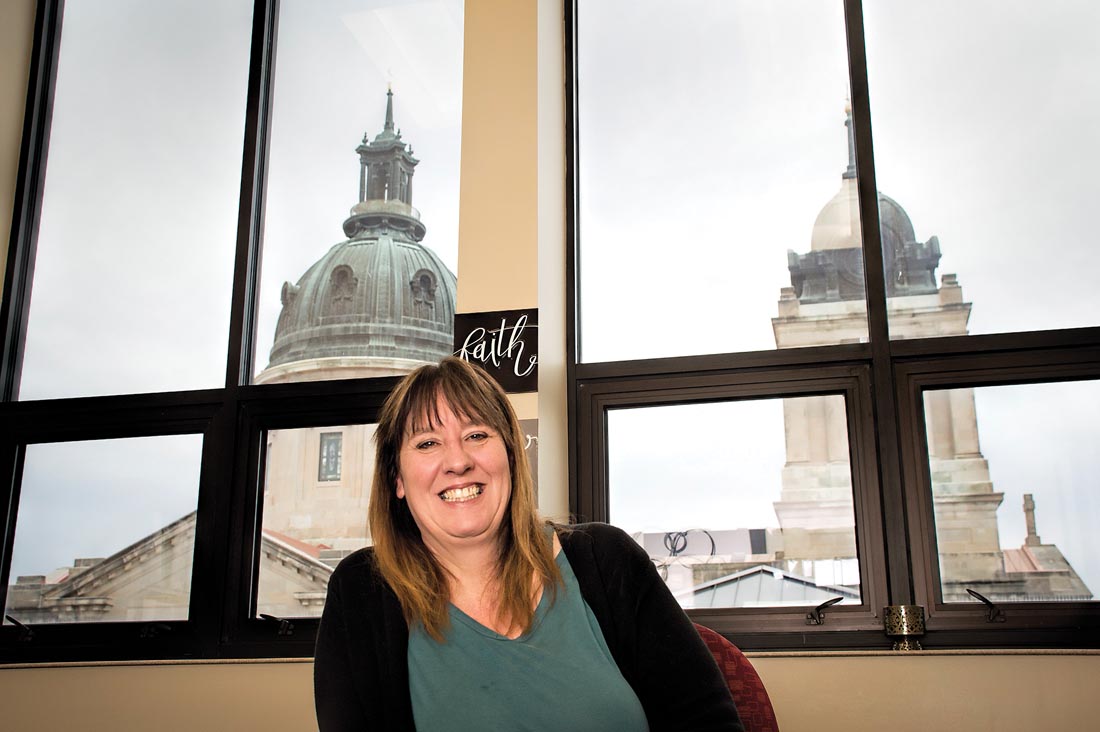
Catholic Charities to begin using online platform to contact and assist their clients
Catholic Charities to begin using online platform to contact and assist their clients
Jodie Beeson is reminded every time she looks out the window as to why she is in her office at Catholic Charities in Wichita. She is assisting with the implementation of technology that will allow the ministry to serve clients more quickly and in some cases more thoroughly. (Advance photo)
Technology is being adopted that will make life easier for Catholic Charities employees and their clients.
The diocesan ministry is implementing, eCare, a software platform that will enable Charities employees to securely connect to clients via a home computer or their video-enabled mobile phone.
Jodie Beeson, director of Grants and Compliance for Catholic Charities, said the technology will help overcome distance barriers because clients and social workers won’t have to drive to an office or home; and it allows the ministry to process clients quickly, clients who might begin a process but neglect to follow up.
“One of the biggest struggles we have is an inability to reach people,” she said, adding that the software will allow them to connect to clients in a way they are now comfortable with – through their mobile phones.
“The engagement levels are much higher. People participate better through video. A lot of people think video – that’s so cold, but if you think about how we communicate with people nowadays – we text – we’re used to doing that,” Beeson said. “When I was in high school, how many hours did we spend with our boyfriends and girlfriends on a telephone, and we made a connection.”
The Wichita Catholic Charities office will initially be able to serve clients in the satellite office in Pittsburg via computers with cameras, and eventually service clients in their homes via mobile phones.
Telecommunication makes some aspects of counseling easier but changes the dynamics. Assessing a client’s physical health, for example, will require different techniques that therapists will soon be trained in.
The telecommunications technology will be phased in, Beeson said, to serve clients in the 25 southcentral and southeast Kansas counties. Initially, it will be used to serve veterans rehousing needs.
“We’ll be able to quickly address their issues, get them enrolled, and get moving with them without waiting to get down to Pittsburg,” she said.
“Then we’ll be able to make connections, which is really important in the homeless population because they’re often unstable and if you don’t move with them rather quickly, you lose them and then it takes a long time before they’ll come back for help.”
That phase will be followed by the SAFE program for victims of domestic abuse.
One of the challenges with domestic abuse is the need to quickly address a situation,” Beeson said. “Somebody is needing to leave and needing to get out. We can quickly get them with a case manager, connect them, and move things into place to get them to a place of safety.”
Technology will speed service by eliminating the need for a counselor to drive to a location to assist a client, saving time that increases the safety of the victim.
“With domestic violence victims, the first thing you want to do is create a safety plan. They may not even be ready to leave their spouse, but if you can get a safety plan in place right away, the statistics, as far as homicides, go down greatly,” she said.
The third phase will be CANA counseling for marriages, families, and individuals, which will be implemented in the spring – after all the therapists are trained.
Clients engage better using teletherapy, Beeson said, partly because of the convenience. Initially, Catholic Charities will offer counseling via the internet at the Pittsburg office. Once employees and clients seem more comfortable with the technology, Charities will then allow clients to log-in from their homes.
“A lot of people who are suffering mental health crises, the getting out and going to therapy is already a huge barrier,” Beeson said.
